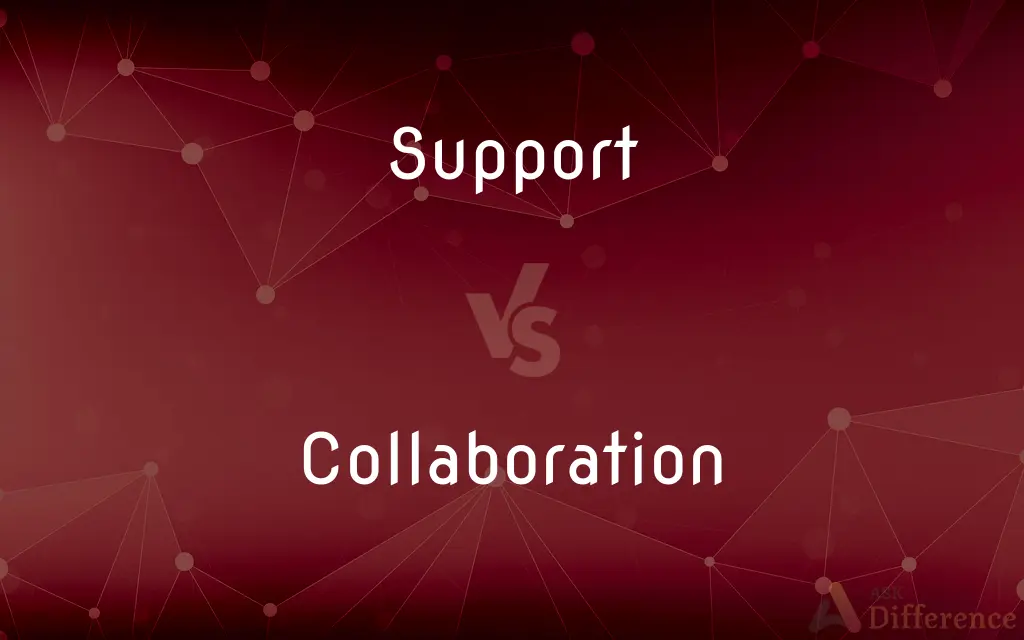Support vs. Collaboration — What's the Difference?
By Urooj Arif & Maham Liaqat — Updated on March 1, 2024
Support involves providing assistance or backing to someone, often unidirectional, while collaboration is a mutual engagement between parties to achieve a common goal. Support is about aid, collaboration about partnership.

Difference Between Support and Collaboration
Table of Contents
ADVERTISEMENT
Key Differences
Support typically denotes one party aiding another, possibly through resources, advice, or emotional backing, without necessarily working together on a project or goal. It's essentially a helping hand, often seen in contexts where one entity possesses something the other needs. Collaboration, in contrast, implies a joint effort where all parties actively contribute their skills, knowledge, or resources towards achieving a shared objective, highlighting a partnership dynamic.
The supporter might not have a direct stake in the outcome beyond the success of the party being supported. Their role is more about enabling or facilitating. Meanwhile, collaboration involves shared responsibility and often shared risks, with each participant having a vested interest in the success of the endeavor. The collaborative process is inherently interactive, requiring ongoing communication and adjustment as the project progresses.
Support can be seen as foundational, providing the groundwork upon which activities can be built or problems solved. It's critical in scenarios where an individual or group lacks certain capabilities or resources. Collaboration, however, is about building on that foundation through collective input and concerted efforts, leveraging the diverse strengths and perspectives of all involved.
Support can function within a hierarchical structure (e.g., a manager supporting a subordinate), collaboration tends to flatten hierarchies, emphasizing equal contribution and shared decision-making. This distinction underlines the different dynamics at play; support can be more directive, whereas collaboration is cooperative.
The outcomes of support and collaboration also differ. Support aims to empower or enable another party to succeed in their endeavors, possibly without altering the supporter's situation. Collaboration seeks a collective win, where success is shared and directly benefits all parties involved.
ADVERTISEMENT
Comparison Chart
Nature
Providing aid or backing, often unilaterally.
Joint effort by parties to achieve a common goal.
Engagement
Typically one-way, with one party aiding another.
Mutual, with all parties actively contributing.
Outcome Focus
Success of the supported party.
Shared success and achievement of a common objective.
Dynamics
Can be hierarchical, with the supporter possibly in a guiding role.
Tends to be egalitarian, emphasizing partnership and equal contribution.
Stake in Outcome
Supporter may not have a direct stake beyond the other's success.
All parties have a vested interest in the collective success.
Compare with Definitions
Support
Technical or professional aid.
IT support ensures our systems run smoothly.
Collaboration
Joint intellectual effort.
Their collaboration produced groundbreaking research.
Support
Offering guidance or advice.
His advice provided the support I needed to make a decision.
Collaboration
Sharing resources for mutual benefit.
The companies' collaboration expanded their market reach.
Support
Emotional or moral encouragement.
Her family's support gave her the confidence to pursue her dreams.
Collaboration
Working together to achieve a shared goal.
The collaboration between departments led to a successful project.
Support
Providing assistance or resources to help others succeed.
The mentor's support was crucial to navigating the new job.
Collaboration
Partnership in creative endeavors.
The artists' collaboration resulted in a stunning exhibition.
Support
Financial backing.
The grant provided support for their research.
Collaboration
Collective problem-solving.
Collaboration among team members solved the critical issue.
Support
To bear the weight of, especially from below; keep from falling, sinking, or slipping
Pillars support the roof.
Collaboration
Collaboration is the process of two or more people, entities or organizations working together to complete a task or achieve a goal. Collaboration is similar to cooperation.
Support
To offer help or advice regarding (a product or service).
Collaboration
The action of working with someone to produce something
He wrote a book in collaboration with his son
Support
The act of supporting
Our candidate needs your support.
Collaboration
The act of working together; united labor.
Support
The state of being supported
The candidate's support has been overwhelming.
Collaboration
The act of willingly cooperating with an enemy, especially an enemy nation occupying one's own country.
Support
One that supports
How many supports does the bridge have?.
Collaboration
Act of working jointly;
They worked either in collaboration or independently
Support
Support with evidence or authority or make more certain or confirm;
The stories and claims were born out by the evidence
Collaboration
Act of cooperating traitorously with an enemy that is occupying your country
Common Curiosities
What is support?
Support refers to the act of providing assistance, resources, or encouragement to others, facilitating their success or well-being.
What is collaboration?
Collaboration is a mutual engagement between two or more parties working together towards a common goal or project.
How do roles differ in support vs. collaboration?
In support, roles are more defined, with a clear supporter and recipient. In collaboration, roles are fluid, with participants sharing responsibilities and contributions.
What skills are important for effective collaboration?
Communication, flexibility, mutual respect, and the ability to share ideas and feedback are crucial for effective collaboration.
Why is support important in teams?
Support within teams is vital for building confidence, fostering a positive environment, and enabling individuals to overcome challenges and grow.
How do support and collaboration differ in a workplace?
In a workplace, support often involves help or resources from one party to another, while collaboration is about partners or teams working together on equal footing towards shared objectives.
Is one more effective than the other?
Effectiveness depends on the context; support is crucial for individual growth and overcoming specific challenges, while collaboration is key for complex projects requiring diverse skills and perspectives.
How does technology facilitate collaboration?
Technology offers tools and platforms that enable real-time communication, sharing of resources, and project management, making it easier for teams to collaborate across distances.
Can support lead to collaboration?
Yes, initial support can lay the groundwork for a collaborative relationship, as parties become more engaged and invested in mutual success.
Can collaboration exist without support?
While collaboration inherently includes elements of support among participants, it focuses more on mutual engagement than on one-sided assistance.
What challenges can arise in collaboration?
Challenges include managing differing opinions, ensuring equal participation, and maintaining clear communication throughout the project.
What is the role of leadership in supporting collaboration?
Leadership plays a crucial role in setting the tone for collaboration by promoting a culture of trust, facilitating communication, and ensuring that collaborative efforts are aligned with organizational goals.
How do you measure the success of collaboration?
Success can be measured by the achievement of the shared goals, the efficiency of the process, and the satisfaction of the participants.
How can a supportive environment enhance collaboration?
A supportive environment fosters trust and openness, encouraging more effective and innovative collaborative efforts.
Can collaboration lead to competition?
While collaboration focuses on mutual goals, it can sometimes lead to competition if objectives shift or if there's a lack of clear communication and shared values.
Share Your Discovery

Previous Comparison
Performativity vs. Performance
Next Comparison
Peaceful vs. SereneAuthor Spotlight
Written by
Urooj ArifUrooj is a skilled content writer at Ask Difference, known for her exceptional ability to simplify complex topics into engaging and informative content. With a passion for research and a flair for clear, concise writing, she consistently delivers articles that resonate with our diverse audience.
Co-written by
Maham Liaqat













































